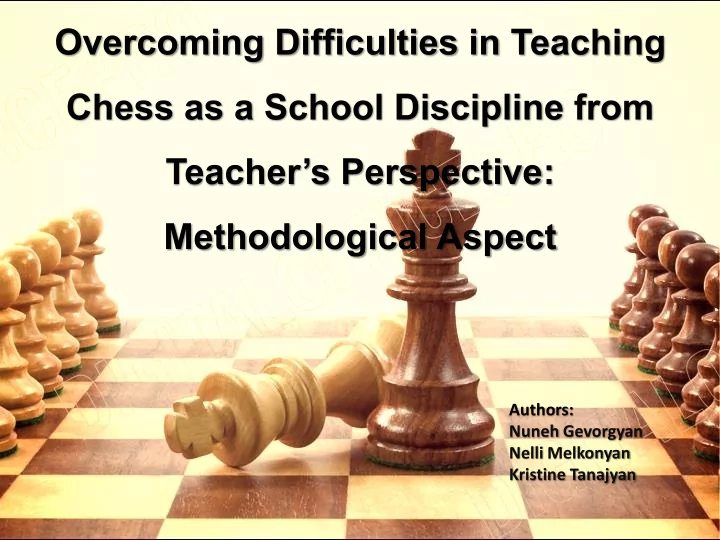

Overcoming Difficulties in Teaching Chess as a School Discipline from Teacher’s Perspective : Methodological Aspect Authors: Nuneh Gevorgyan Nelli Melkonyan Kristine Tanajyan
The aim of the research The theoretical aim of our sociological research is to contribute to the enhancement of the efficiency of teacher-pupil interaction developing new approaches as incentives for their development. The practical aim of the research is to submit the teacher-pupil interaction problems and the ways of overcoming them – within the framework of teaching chess as a school subject and from teacher’s perspective – to the respective research. The practical aim of the research is to unearth the factors and the cause-reason connections between the factors that motivate the strengths and weaknesses of teacher’s behaviour through analysing the video recordings of the lessons of chess.
The survey method In-depth interview Content-analysis
3.2.Stimulates 3.1. Groups up pupils’ active the knowledge cognitive gained during process. the lesson. 3.7.The information is assimilated by pupils under an active regime making use of the 5.3. situations of Judgments fundamental issues and interactional appear to be cycles. analytical. 6.4. The in-class 7.3.The teacher processes are appears to have 3.8. Pupils appear to characterized by pedagogical be active and engaged tactfulness, high level of participants of thoughtfulness and individual cognitive processes. delicacy. activeness. 6.3. The teacher takes into account 7.5.The teacher is the individual kind-hearted, attentive and needs of every caring. pupil.
3.2.Stimulates 3.1. Groups up pupil’ active the knowledge cognitive gained during process. the lesson. 3.7.The information is assimilated by pupils under an active regime making use of the 5.3. situations of Judgments fundamental issues and interactional appear to be cycles. analytical. 6.4. The in-class processes are 3.8. Pupils appear to characterized by be active and engaged high level of participants of individual cognitive processes. activeness.
3.2.Stimulates pupils’ active cognitive process. 3.7.The information is assimilated by pupils under an active regime making use of the 5.3. situations of Judgments fundamental issues and interactional appear to be cycles. analytical. 6.4. The in-class processes are 3.8. Pupils appear to characterized by be active and engaged high level of participants of individual cognitive processes. activeness.
3.7.The information is assimilated by pupils under an active regime making use of the situations of fundamental issues and interactional cycles. 6.4. The in-class processes are 3.8. Pupils appear to characterized by be active and engaged high level of participants of individual cognitive processes. activeness.
4.3. The The discourse discourse is rich is elucidated in formulations, and exposed. variety of forms and is expressive. The in-class process is characterized by high level of individual activeness among pupils .
Factors that increase efficiency In order to enrich the lesson with all the aforementioned factors that add up efficiency, the majority of teachers involved in the survey (87.5%) highlighted the significance of pair work among pupils, namely the precondition of cooperation- based communication among the pupils.
Involvement of parents 81.25% 12.50% 6.25% is important is not so important is not important կարևոր է ոչ այնքան կարևոր կարևոր չէ ծնողի ներգրավվածությունը
Pedagogical approaches 37.50% 62.50% authoritarian democratic լիբերալ ոճ approach approach ավտորիտար ոճ
Suggestions • Primary-school pupils’ active engagement from the very first lesson. They act with real chess, they decode and project the pieces on the demonstrational board onto the real board or their copy book. This might contribute to an automatic or involuntary memorization of the educational material delivered. • Use of activating, motivating and encouraging methods in the work with primary- school pupils. This might cause some discrepancies, especially, from the followers (henchmen) of traditional education patterns who see similarities and direct correlations between pupils’ free self-expression and disorganization and disorder problems. • The study of the pedagogical experience conducted during chess lessons allows inferring that the implementation of situational modelling component might be of considerable significance for educational process efficiency increase. • Establishment and safeguarding of trilateral cooperation Parent-Child-Educator through the interaction among the above-mentioned parties («parents’ engagement»). • Clear lesson planning. The teacher must visualize the lesson beforehand, schedule the time to be spent on different lesson sections on theoretical and practical issues to be discussed, anticipating different situations to face through premeditated approaches as guidelines. • A teacher of chess must preferably be a ranked (rated) chess player with pedagogical qualification An educationist, no matter how skillful s(h)e might be or how much s(h)e might have mastered the respective techniques, without profound knowledge in chess, wouldn’t be able to introduce the whole complex world of chess in an expressive way.
Recommend
More recommend